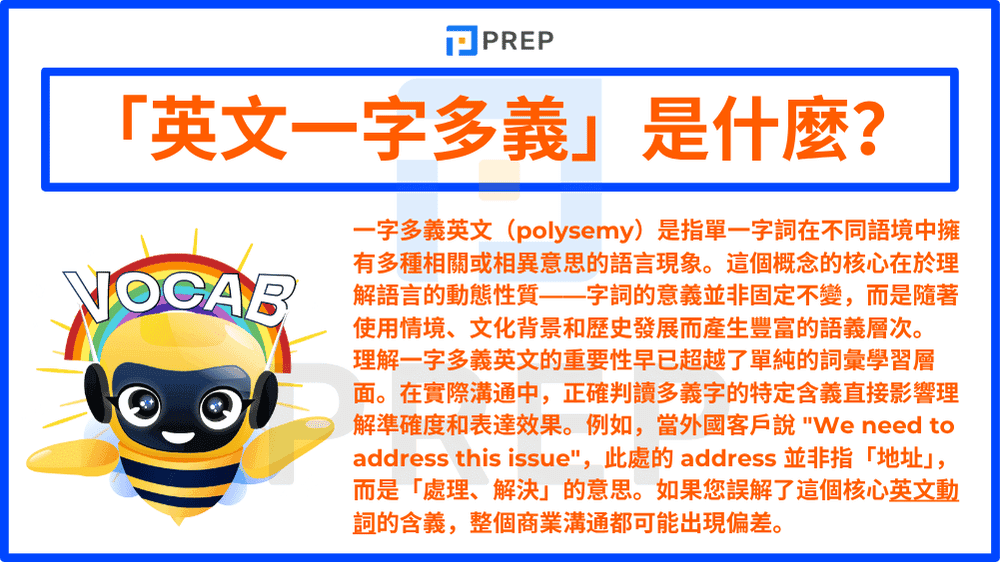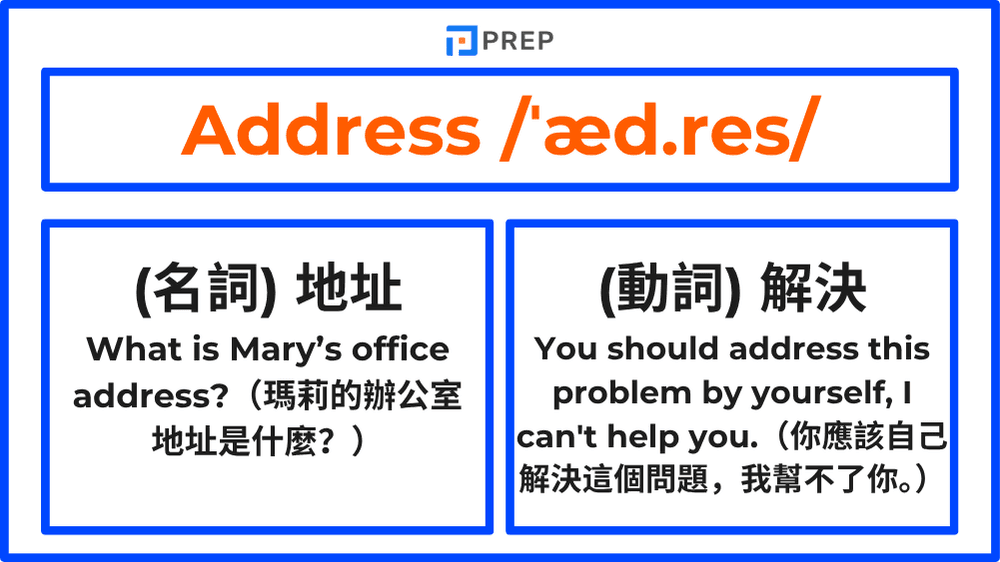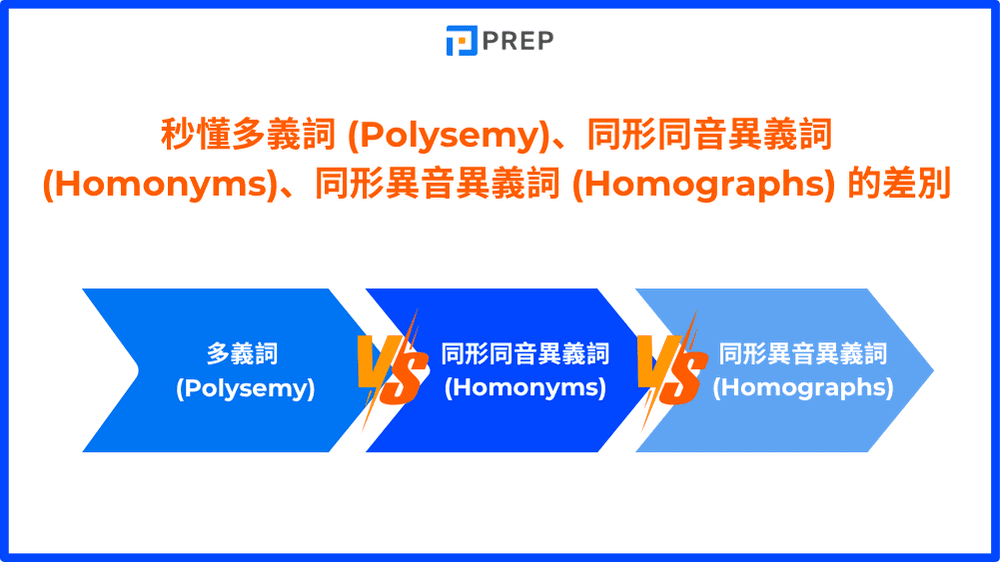完全掌握一字多義英文(含多益高頻字、實用記憶法與情境應用)
學習英文的路上,您是否曾因為同一個字在不同情境中出現截然不同的意思而感到困惑,甚至在雅思、多益考試中因此失分?掌握一字多義英文是每位英文學習者邁向精通的關鍵技能。
這個現象在語言學中稱為「polysemy」,是所有成熟語言發展過程中的自然結果。當您遇到 "bank" 這個字時,它可能指的是「銀行」、「河岸」,甚至是「傾斜」的動作。在PREP的教學經驗中,我們發現多義字掌握程度往往決定了學習者在閱讀理解和聽力測驗中的表現差異。考試設計者經常運用多義字的不同含義設置陷阱選項,測試考生對語境判斷的敏感度。因此,系統性地學習高頻多義字不僅是提升英文能力的關鍵,更是在標準化考試中脫穎而出的策略要素。
本文將帶您深入探索英文一字多義的奧妙世界,從基礎概念釐清到高頻詞彙整理,再到實戰應用技巧,為您建構完整的學習框架。無論您是準備雅思、多益考試的學習者,還是希望提升英文表達能力的專業人士,這份指南都將成為您突破語言瓶頸的有力工具。現在就讓我們開始這趟語言探索之旅。

I. 「英文一字多義」是什麼?
一字多義英文(polysemy)是指單一字詞在不同語境中擁有多種相關或相異意思的語言現象。這個概念的核心在於理解語言的動態性質——字詞的意義並非固定不變,而是隨著使用情境、文化背景和歷史發展而產生豐富的語義層次。
理解一字多義英文的重要性早已超越了單純的詞彙學習層面。在實際溝通中,正確判讀多義字的特定含義直接影響理解準確度和表達效果。例如,當外國客戶說 "We need to address this issue",此處的 address 並非指「地址」,而是「處理、解決」的意思。如果您誤解了這個核心英文動詞的含義,整個商業溝通都可能出現偏差。
從語言學角度來看,多義現象的產生源於人類認知中的概念延伸機制。人們傾向於用熟悉的概念來理解新事物,因此一個字的原始意義會透過隱喻、轉喻等認知過程擴展到相關領域。比如 "head" 從人體部位的「頭部」延伸為組織的「首長」、物件的「頂端」,甚至是動詞的「前往」。這種延伸遵循著人類思維的邏輯性,因此掌握其中規律能幫助您更有效地學習和記憶。
雅思、多益考試中,一字多義英文的掌握程度往往決定了考生在閱讀理解和聽力測驗中的表現差異。考試設計者經常運用多義字的不同含義設置陷阱選項,測試考生對語境判斷的敏感度。因此,系統性地學習高頻多義字不僅是提升英文能力的關鍵,更是在標準化考試中脫穎而出的策略要素。

II. 一字多義英文列表
掌握高頻一字多義英文是建立英文語感的重要基石。以下整理的詞彙,依據雅思、多益考試的出現頻率以及日常使用的重要性進行分級,讓您能夠有效地分配學習資源,並優先掌握最實用的內容。
|
一字多義英文單字 |
意義 |
例句 |
|
Address /ˈæd.res/ |
(名詞) 地址 |
What is Mary’s office address?(瑪莉的辦公室地址是什麼?) |
|
(動詞) 解決 |
You should address this problem by yourself, I can't help you.(你應該自己解決這個問題,我幫不了你。) |
|
|
Arm /ɑːrm/ |
(名詞) 手臂 |
He hurt his arm playing rugby.(他打橄欖球時弄傷了手臂。) |
|
(動詞) 武裝 |
The soldiers were armed with rifles.(士兵們配備了步槍。) |
|
|
Article /ˈɑː.tɪ.kəl/ |
(名詞) 文章 |
I read an article about climate change.(我閱讀了一篇關於氣候變遷的文章。) |
|
(名詞) 物品 |
Please return any lost articles to reception.(請將遺失物品交還給櫃檯。) |
|
|
Account /əˈkaʊnt/ |
(名詞) 帳戶 |
I opened a bank account.(我開了一個銀行帳戶。) |
|
(名詞) 描述、解釋 |
He gave a detailed account of the events.(他詳細描述了事件的經過。) |
|
|
(動詞) 解釋、說明 |
How do you account for the missing money?(你怎麼解釋這筆錢不見了?) |
|
|
Band /bænd/ |
(名詞) 樂團 |
The band is performing tonight.(這個樂團今晚有演出。) |
|
(名詞) 帶子 / 橡皮圈 |
Tie the box with a rubber band.(用橡皮筋綁住盒子。) |
|
|
Bark /bɑːrk/ |
(名詞) 樹皮 |
The tree has rough bark.(這棵樹的樹皮很粗糙。) |
|
(動詞) 吠叫 |
The dog barked all night.(那隻狗整晚都在吠叫。) |
|
|
Bat /bæt/ |
(名詞) 球棒 |
He swung the bat and hit a home run.(他揮棒打出全壘打。) |
|
(名詞) 蝙蝠 |
A bat flew out of the cave.(一隻蝙蝠從洞穴飛出來。) |
|
|
Base /beɪs/ |
(名詞) 基地 |
The troops returned to the base.(部隊回到基地。) |
|
(動詞) 以…為根據、建立在…上 |
This film is based on a true story.(這部電影根據真實故事改編。) |
|
|
(名詞) 基礎、基底 |
Trust is the base of every relationship.(信任是每段關係的基石。) |
|
|
Book /bʊk/ |
(名詞) 書籍 |
This is my favorite book.(這是我最喜歡的書。) |
|
(動詞) 預訂 |
I booked a table for two.(我預訂了兩人座位。) |
|
|
Change /tʃeɪndʒ/ |
(名詞) 改變 |
There was a sudden change in the weather.(天氣突然變了。) |
|
(名詞) 零錢 |
Do you have any change for a dollar?(你有一塊錢的零錢嗎?) |
|
|
(動詞) 改變 |
He changed his mind at the last minute.(他在最後一刻改變了主意。) |
|
|
Clip /klɪp/ |
(名詞) 夾子 |
Use a paper clip to hold the papers.(用迴紋針夾住文件。) |
|
(名詞) 影片剪輯 |
I watched a funny video clip.(我看了一個有趣的影片片段。) |
|
|
(動詞) 剪、修剪 |
He clipped the article from the newspaper.(他把文章從報紙剪下來。) |
|
|
Can /kæn/ |
(助動詞) 能夠 |
She can speak three languages fluently.(她能說三種語言非常流利。) |
|
(名詞) 罐頭 |
I opened a can of tuna for lunch.(我午餐打開了一罐鮪魚罐頭。) |
|
|
(動詞) 將…裝入罐頭 |
They canned the peaches to preserve them for winter.(他們將水蜜桃裝罐保存過冬。) |
|
|
Capital /ˈkæp.ɪ.təl/ |
(名詞) 首都 |
Paris is the capital of France.(巴黎是法國的首都。) |
|
(名詞) 資本、資金 |
He invested a large amount of capital in the business.(他投入大量資金於生意。) |
|
|
(形容詞) 大寫的 |
Write the proper nouns in capital letters.(專有名詞要用大寫字母書寫。) |
|
|
Case /keɪs/ |
(名詞) 案例、情況 |
In this case, we’ll need approval.(在這種情況下,我們需要批准。) |
|
(名詞) 盒子、容器 |
I bought a pencil case.(我買了一個鉛筆盒。) |
|
|
(名詞) 案件、訴訟 |
The case will go to trial.(這個案件將會開庭。) |
|
|
Coin /kɔɪn/ |
(名詞) 硬幣 |
I found a gold coin under the couch.(我在沙發下發現一枚金幣。) |
|
(動詞) 創造(新詞) |
The term 'selfie' was coined in 2002.( “自拍” 這個詞是在2002年被創造出來的。) |
|
|
Date /deɪt/ |
(名詞) 日期 |
What’s today’s date?(今天幾號?) |
|
(名詞) 約會 |
They went on a date last night.(他們昨晚去約會了。) |
|
|
(名詞) 椰棗(水果) |
Dates are very sweet and healthy.(椰棗又甜又健康。) |
|
|
Drop /drɒp/ |
(動詞) 掉落 |
Be careful not to drop your phone.(小心不要把手機掉了。) |
|
(名詞) 一滴 |
A drop of rain landed on my face.(一滴雨打在我臉上。) |
|
|
(動詞) 降低、下降 |
Temperatures dropped last night.(昨晚氣溫下降了。) |
|
|
Drill /drɪl/ |
(名詞) 鑽孔機 |
He used a drill to hang the picture on the wall.(他使用鑽孔機把畫掛在牆上。) |
|
(名詞) 演練 |
We had a fire drill at school today.(我們今天在學校進行了消防演練。) |
|
|
(動詞) 鑽孔 |
The workers are drilling into the concrete.(工人正在鑽混凝土。) |
|
|
Deal /diːl/ |
(動詞) 處理 |
I’ll deal with that later.(我稍後會處理這件事。) |
|
(名詞) 交易、協議 |
That’s a good deal for both sides.(對雙方來說都是好交易。) |
|
|
(動詞) 分配、發(牌) |
The dealer is dealing the cards.(荷官正在發牌。) |
|
|
Engage /ɪnˈɡeɪdʒ/ |
(動詞) 訂婚 |
They got engaged last week.(他們上週訂婚了。) |
|
(動詞) 參與、從事 |
He engages in volunteer work.(他參加志願服務工作。) |
|
|
(動詞) 吸引(注意) |
The movie engaged the audience from beginning to end.(電影從頭到尾都吸引住觀眾。) |
|
|
Entertain /ˌen.təˈteɪn/ |
(動詞) 款待、娛樂 |
They entertained guests at home.(他們在家招待客人。) |
|
(動詞) 心中懷有(想法) |
He entertained the idea of quitting his job.(他心中浮現辭職的念頭。) |
|
|
Exercise /ˈek.sə.saɪz/ |
(名詞) 運動 |
I do exercise daily.(我每天運動。) |
|
(動詞) 行使(權力等) |
The president exercised his veto power.(總統行使了否決權。) |
|
|
(名詞) 練習題 |
Please complete the grammar exercise.(請完成文法練習題。) |
|
|
Fall /fɔːl/ |
(動詞) 落下 |
Leaves fall in autumn.(樹葉秋天會掉落。) |
|
(名詞) 秋天(美式用法) |
Fall is my favorite season.(我最喜歡的季節是秋天。) |
|
|
(名詞) 跌倒 |
I had a bad fall on the stairs.(我在樓梯上摔了一跤。) |
|
|
File /faɪl/ |
(名詞) 檔案 |
I saved the document as a PDF file.(我把這份文件存成 PDF 檔。) |
|
(名詞) 銼刀 |
She used a nail file to smooth her nails.(她用指甲銼刀修整指甲。) |
|
|
(動詞) 歸檔、提交 |
You must file your tax return before April 15th.(你必須在 4 月 15 日前提交報稅表。) |
|
|
Fly /flaɪ/ |
(動詞) 飛行 |
Birds fly south for the winter.(鳥類在冬天會往南飛。) |
|
(名詞) 蒼蠅 |
There’s a fly on your sandwich!(你的三明治上有一隻蒼蠅!) |
|
|
(名詞) 褲子拉鍊 |
Your fly is open — better zip it up.(你的褲子拉鍊沒拉——快拉上吧。) |
|
|
Fin /faɪn/ |
(形容詞) 好的、健康的 |
I’m feeling fine, thanks for asking.(我很好,謝謝你關心。) |
|
(名詞) 罰款 |
He had to pay a $100 parking fine.(他因違規停車被罰了一百元。) |
|
|
(動詞) 處以罰款 |
The company was fined for polluting the river.(該公司因污染河流被處以罰款。) |
|
|
Figure /ˈfɪɡ.jər/ |
(名詞) 數字 |
Sales figures are rising.(銷售數字正在上升。) |
|
(名詞) 人物、身影 |
A dark figure appeared in the doorway.(門口出現一個黑影。) |
|
|
(動詞) 認為、估計 |
I figure we’ll be there by noon.(我估計中午會到那裡。) |
|
|
Game /ɡeɪm/ |
(名詞) 遊戲 |
Let’s play a board game.(我們來玩桌遊吧。) |
|
(名詞) 野獸(狩獵) |
They hunted wild game in the forest.(他們在森林裡打獵。) |
|
|
Ground /ɡraʊnd/ |
(名詞) 地面 |
The ground is wet.(地面是濕的。) |
|
(名詞) 理由、根據 |
He lost on the grounds of lack of evidence.(因缺乏證據而敗訴。) |
|
|
(動詞) 禁足 |
I was grounded for being late.(我因為遲到被禁足了。) |
|
|
Grill /ɡrɪl/ |
(名詞) 烤架 |
Put the meat on the grill.(把肉放在烤架上。) |
|
(動詞) 烤 |
I grilled some vegetables for dinner.(我晚餐烤了些蔬菜。) |
|
|
(動詞) 嚴厲盤問 |
The police grilled the suspect for hours.(警察盤問嫌犯好幾小時。) |
|
|
Grip /ɡrɪp/ |
(動詞) 握緊、抓牢 |
He gripped the steering wheel tightly.(他牢牢握住方向盤。) |
|
(名詞) 抓握力 |
She lost her grip and slipped.(她失去平衡滑倒了。) |
|
|
(名詞/隱喻) 控制、影響力 |
The country is in the grip of a recession.(這個國家正受到經濟衰退的影響。) |
|
|
Head /hed/ |
(名詞) 頭部 |
She nodded her head in agreement.(她點頭表示同意。) |
|
(動詞) 朝...前進 |
We’re heading to the airport now.(我們現在要去機場了。) |
|
|
(動詞) 領導 |
She heads the marketing department.(她領導行銷部門。) |
|
|
Hold /həʊld/ |
(動詞) 拿著、抱著 |
Please hold the baby carefully.(請小心抱著嬰兒。) |
|
(動詞) 舉辦、舉行 |
They will hold a meeting tomorrow.(他們明天會舉行會議。) |
|
|
(名詞) 控制、掌握 |
The team kept a strong hold on the lead.(該隊始終牢牢掌握領先優勢。) |
|
|
Hook /hʊk/ |
(名詞) 掛鉤 |
Hang your coat on the hook.(把你的外套掛在掛鉤上。) |
|
(動詞) 掛上、勾住 |
He hooked the cable to the machine.(他把電線接到機器上。) |
|
|
(名詞) 吸引人的元素 |
The song has a catchy hook.(這首歌有個洗腦的旋律段落。) |
|
|
Host /həʊst/ |
(名詞) 主持人 |
He’s the host of the show.(他是這個節目的主持人。) |
|
(動詞) 主辦、接待 |
Our school will host the science fair.(我們學校將主辦科學展。) |
|
|
(名詞) 大量,一大群 |
A host of problems arose after the meeting.(會議後出現了一大堆問題。) |
|
|
Issue /ˈɪʃ.uː/ |
(名詞) 問題、議題 |
Environmental pollution is a serious global issue.(環境污染是一個嚴重的全球性議題。) |
|
(名詞) 期刊號/發行物 |
I just received the latest issue of the magazine.(我剛收到這本雜誌的最新一期。) |
|
|
(動詞) 發布、頒布 |
The government issued a new travel advisory.(政府發布了新的旅遊警示。) |
|
|
Interest /ˈɪn.trəst/ |
(名詞) 興趣、關心 |
She has a strong interest in science fiction.(她對科幻小說非常感興趣。) |
|
(名詞) 利息 |
You will earn interest on your savings.(你的存款會產生利息。) |
|
|
(動詞) 引起興趣 |
That topic really interests me.(那個話題真的引起了我的興趣。) |
|
|
Iron /ˈaɪə(r)n/ |
(名詞) 鐵 |
This bridge is made of solid iron.(這座橋是用純鐵建成的。) |
|
(名詞) 熨斗 |
I need to buy a new iron — mine is broken.(我需要買一個新的熨斗 —— 我的壞了。) |
|
|
(動詞) 熨、燙衣服 |
She ironed her shirt before the interview.(她在面試前燙了襯衫。) |
|
|
Inside /ˈɪn.saɪd/ |
(副詞) 在裡面 |
It started raining, so we went inside.(開始下雨了,所以我們進到裡面去了。) |
|
(名詞) 內部、內情 |
Inside knowledge of the company.(關於該公司的內幕消息。) |
|
|
(形容詞) 內部的 |
The inside story of the scandal.(這起醜聞的內情故事。) |
|
|
Jam /dʒæm/ |
(名詞) 果醬 |
I like toast with strawberry jam for breakfast.<(我早餐喜歡吃塗草莓果醬的吐司。) |
|
(名詞) 交通堵塞 |
We were stuck in a traffic jam for an hour.(我們在交通堵塞中困了一個小時。) |
|
|
(動詞) 卡住、塞住 |
My drawer is jammed and won’t open.(我的抽屜卡住了,打不開。)) |
|
|
Joint /dʒɔɪnt/ |
(名詞) 關節 |
He has pain in his knee joint.(他的膝關節疼痛。) |
|
(名詞) 餐館、場所(非正式) |
Let’s grab a burger at that new joint downtown.(我們去市中心那家新的漢堡店吧。) |
|
|
(形容詞) 共同的、聯合的 |
They issued a joint statement after the meeting.(會後他們發表了聯合聲明。) |
|
|
Judge /dʒʌdʒ/ |
(名詞) 法官 |
The judge announced the verdict.(法官宣布了判決結果。) |
|
(動詞) 批判、判斷 |
You shouldn’t judge others.(你不應該評斷別人。) |
|
|
(動詞) 擔任評審 |
He judged a talent show.(他擔任了一場才藝表演的評審。) |
|
|
Just /dʒʌst/ |
(副詞) 剛剛、才 |
She just left the office a minute ago.(她剛剛一分鐘前才離開辦公室。) |
|
(副詞) 僅僅、只是 |
I’m just looking, thanks.(我只是看看,謝謝。) |
|
|
(形容詞) 公平的、公正的 |
We all want a just society.(我們都渴望一個公平的社會。) |
|
|
Key /kiː/ |
(名詞) 鑰匙 |
I can't get into the house — I lost my key.(我進不了家門——我把鑰匙弄丟了。) |
|
(名詞) 鍵、按鍵 |
Press the Enter key to continue.(按下「Enter」鍵繼續。) |
|
|
(形容詞) 關鍵的、主要的 |
Communication is a key skill in teamwork.(溝通是團隊合作中的關鍵技能。) |
|
|
Kind /kaɪnd/ |
(名詞) 種類 |
What kind of music do you like?(你喜歡哪種音樂?) |
|
(形容詞) 仁慈的、友善的 |
She’s very kind.(她非常親切。) |
|
|
Kick /kɪk/ |
(動詞) 踢 |
He kicked the ball into the goal.(他把球踢進了球門。) |
|
(名詞) 踢擊 |
That was a powerful kick!(那是一記有力的踢擊!) |
|
|
(名詞) 快感、一時的刺激 |
He gets a kick out of extreme sports.(他從極限運動中獲得刺激快感。) |
|
|
Knock /nɒk/ |
(動詞) 敲、叩 |
Please knock before entering the room.(請在進房間前先敲門。) |
|
(動詞) 撞上、碰撞 |
He knocked his head on the ceiling.(他頭撞到了天花板。) |
|
|
(名詞) 敲擊聲、撞擊聲 |
A knock at the window woke me up.(窗戶上的敲擊聲把我吵醒了。) |
|
|
Lead /liːd/ – /lɛd/ |
(動詞) 領導、帶領(/liːd/) |
She leads the project.(她負責這個專案。) |
|
(名詞) 領先地位(/liːd/) |
He’s in the lead.(他目前領先。) |
|
|
(名詞) 鉛(金屬)(/lɛd/) |
Lead pipes were banned.(鉛管已被禁止使用。) |
|
|
Light /laɪt/ |
(名詞) 光、燈光 |
Turn on the light, it’s getting dark.(開燈吧,天快黑了。) |
|
(形容詞) 輕的 |
This suitcase is very light — I can lift it easily.(這個行李箱很輕,我可以輕鬆提起來。) |
|
|
(動詞) 點燃、照亮 |
He lit a candle during the power outage.(停電時他點了一根蠟燭。) |
|
|
Letter /ˈlet.ər/ |
(名詞) 信件 |
She wrote a letter to her friend.(她寫信給朋友。) |
|
(名詞) 字母 |
The letter 'A' is the first in the alphabet.(字母 A 是字母表中的第一個字母。) |
|
|
Leave /liːv/ |
(動詞) 離開 |
He left the room quietly.(他悄悄地離開了房間。) |
|
(名詞) 假期、休假 |
She is on maternity leave.(她正在休產假。) |
|
|
(動詞) 留下、留下來 |
Leave a message after the beep.(請在嗶聲後留言。) |
|
|
Line /laɪn/ |
(名詞) 行、列(文字) |
A line from the poem stuck with me.(我記住了詩中的一句話。) |
|
(名詞) 隊伍、排 |
Stand in line, please.(請排隊。) |
|
|
(名詞) 電話線、連線 |
The phone line is busy.(電話線佔線中。) |
|
|
Match /mætʃ/ |
(名詞) 比賽、競賽 |
The football match ended in a draw.(這場足球比賽以平手結束。) |
|
(動詞) 相配、匹配 |
These shoes match your dress perfectly.(這雙鞋跟你的洋裝非常相配。) |
|
|
(名詞) 火柴棒 |
He struck a match to light the candle.(他劃了一根火柴點燃蠟燭。) |
|
|
Mark /mɑːk/ |
(名詞) 痕跡、印記 |
There was a scratch mark on the table.(桌子上有一道刮痕。) |
|
(動詞) 做記號、標示 |
Please mark your name on the test paper.(請在試卷上標記你的名字。) |
|
|
(名詞) 分數、成績 |
He got the highest mark in the class.(他得了全班最高分。) |
|
|
Mean /miːn/ |
(動詞) 意指、意思是 |
What does this word mean?(這個詞是什麼意思?) |
|
(形容詞) 刻薄的、兇惡的 |
He’s so mean to her.(他對她太刻薄了。) |
|
|
(名詞) 平均數 |
The mean score was 70.(平均分是 70 分。) |
|
|
Mine /maɪn/ |
(名詞) 礦場、礦坑 |
The workers went deep into the coal mine.(工人們深入煤礦坑作業。) |
|
(代名詞) 我的(東西) |
That phone isn’t yours — it’s mine.(那支手機不是你的,是我的。) |
|
|
(動詞) 採礦、挖掘 |
hey used heavy equipment to mine for gold.(他們用重型機械來採金。) |
|
|
Nail /neɪl/ |
(名詞) 指甲 |
She painted her nails.(她塗了指甲油。) |
|
(名詞) 釘子 |
Hammer the nail into the wall.(把釘子釘進牆裡。) |
|
|
(動詞) 完美完成、釘牢 |
He nailed the exam.(他考得非常好。) |
|
|
Note /nəʊt/ |
(名詞) 便條、備忘 |
Leave a note on the fridge.(在冰箱上留個便條。) |
|
(動詞) 注意、留意 |
Note the difference between the two versions.(注意這兩個版本的不同。) |
|
|
(名詞) 音符 |
She sang a high note.(她唱了一個高音。) |
|
|
Net /net/ |
(名詞) 網、網子 |
The fisherman cast his net into the sea.(漁夫把網撒進海裡。) |
|
(形容詞) 淨的(收入等) |
His net income after taxes is $3,000 a month.(扣稅後他的淨收入是每月三千美元。) |
|
|
(動詞) 進球、得分 |
He netted the winning goal in the final minute.(他在最後一分鐘進了致勝一球。) |
|
|
Number /ˈnʌm.bər/ |
(名詞) 數字 |
Please write your phone number here.(請在這裡填寫你的電話號碼。) |
|
(動詞) 給...編號 |
The pages are numbered 1 through 20.(頁面從 1 到 20 編好號。) |
|
|
(名詞) 歌曲、舞碼 |
She performed a lively jazz number on stage.(她在舞台上表演了一段活潑的爵士舞碼。) |
|
|
Order /ˈɔː.dər/ |
(名詞) 訂單、點餐 |
I placed an order for two pizzas.(我點了兩個披薩的訂單。) |
|
(名詞) 秩序、整齊 |
The teacher asked the class to stay in order.(老師要求班上保持秩序。) |
|
|
(動詞) 命令、指示 |
The officer ordered the soldiers to retreat.(軍官命令士兵撤退。) |
|
|
Object /ˈɒb.dʒɪkt/ (n) /əbˈdʒekt/ (v) |
(名詞) 物體 |
What is that shiny object on the table?(桌上那個閃亮的物體是什麼?) |
|
(名詞) 受詞(語法) |
In “I love her,” “her” is the object.(在 “I love her” 這句中,“her” 是受詞。) |
|
|
(動詞) 反對 |
Many people objected to the new policy.(許多人反對這項新政策。) |
|
|
Open/ˈəʊ.pən/ |
(形容詞) 開著的 |
The door is open.(門開著。) |
|
(動詞) 打開 |
Open the window.(打開窗戶。) |
|
|
(形容詞) 坦率的、開放的 |
She’s open with her thoughts.(她對自己的想法很坦率。) |
|
|
Over/ˈəʊ.vər/ |
(介詞) 在⋯⋯上方 |
The lamp is over the table.(燈在桌子的上方。) |
|
(副詞) 結束 |
The game is over.(比賽結束了。) |
|
|
Pass/pɑːs/ |
(動詞) 通過(考試等) |
She studied hard and finally passed the exam.(她努力讀書,終於通過了考試。) |
|
(動詞) 給、遞交 |
Can you pass me the salt, please?(你可以把鹽遞給我嗎?) |
|
|
(名詞) 通行證、證件 |
You need a security pass to enter the building.(你需要通行證才能進入這棟大樓。) |
|
|
Point/pɔɪnt/ |
(名詞) 分數、點 |
He got ten points.(他得了十分。) |
|
(動詞) 指、指向 |
She pointed at the board.(她指著白板。) |
|
|
(名詞) 重點、目標、意義 |
What’s the point of this?(這有何意義?) |
|
|
Play/pleɪ/ |
(動詞) 玩、演奏 |
The kids are playing outside.(孩子們在外面玩。) |
|
(名詞) 戲劇、劇本 |
Shakespeare’s play is a classic.(莎士比亞的戲劇是經典之一。) |
|
|
(動詞) 播放 |
Can you play that song again?(你可以再播放那首歌嗎?) |
|
|
Post/pəʊst/ |
(名詞) 網路貼文 |
I saw her post on Instagram this morning.(我今天早上看到她在 Instagram 上的貼文。) |
|
(名詞) 郵件、郵政(英式) |
The letter arrived in this morning’s post.(那封信是今天早上的郵件寄來的。) |
|
|
(動詞) 張貼、發布 |
He posted a job opening on the company's website.(他在公司網站上發布了招聘資訊。) |
|
|
Present /ˈprez.ənt/ (n/adj) /prɪˈzent/ (v) |
(名詞) 禮物 |
She received a beautiful birthday present.(她收到了一份漂亮的生日禮物。) |
|
(形容詞) 當下的 |
I’m not available at the present time.(我現在這個時候沒空。) |
|
|
(動詞) 展示、呈現 |
She will present her project.(她將展示她的專案。) |
|
|
Press/pres/ |
(動詞) 按下、壓 |
Press the button to start.(按下按鈕啟動。) |
|
(名詞) 媒體、新聞界 |
Freedom of the press is important.(新聞自由是重要的。) |
|
|
(名詞) 壓力、擠壓 |
He’s under a lot of press lately.(他最近壓力很大。) |
|
|
Quarter /ˈkwɔː.tər/ |
(名詞) 四分之一 |
Cut the cake into quarters.(把蛋糕切成四等份。) |
|
(名詞) 區域(城市一部分) |
The French Quarter in New Orleans is very famous.(紐奧良的法國區非常有名。) |
|
|
(名詞) 季度(三個月) |
The company made a profit in the first quarter of the year.(公司在第一季度獲利了。) |
|
|
Quiet /ˈkwaɪ.ət/ |
(形容詞) 安靜的、寧靜的 |
This is a quiet neighborhood.(這是一個寧靜的社區。) |
|
(名詞) 寂靜、沉默 |
There was a long moment of quiet after the announcement.(公布消息後,有一段長時間的沉默。) |
|
|
(動詞) 使安靜、平息 |
He tried to quiet the crying baby.(他試圖讓正在哭的嬰兒安靜下來。) |
|
|
Question /ˈkwes.tʃən/ |
(名詞) 問題、疑問句 |
Ask a question if you don’t understand.(如果不懂就舉手發問。) |
|
(動詞) 質疑、懷疑 |
I question his motives.(我質疑他的動機。) |
|
|
Right /raɪt/ |
(形容詞) 正確的 |
That’s the right answer.(那是正確答案。) |
|
(名詞) 權利 |
Human rights should be protected.(人權應該受到保障。) |
|
|
(副詞) 立刻、馬上 |
Come right now!(馬上過來!) |
|
|
Rock /rɒk/ |
(名詞) 岩石、石頭 |
Climb the rocks carefully.(小心地攀爬岩石。) |
|
(名詞) 搖滾音樂 |
A rock band is performing tonight.(今晚有搖滾樂團演出。) |
|
|
(動詞) 搖晃、搖動 |
She rocked the baby to sleep.(她搖著嬰兒入睡。) |
|
|
Ring /rɪŋ/ |
(名詞) 戒指 |
He gave her a diamond engagement ring.(他送她一枚鑽石訂婚戒指。) |
|
(動詞) 打電話 |
I’ll ring you later this evening.(我今晚稍後會打電話給你。) |
|
|
(名詞) 鈴聲、響聲 |
The ring of the bell startled everyone.(鈴聲讓大家嚇一跳。) |
|
|
Roll /rəʊl/ |
(動詞) 滾動 |
The ball rolled away.(球滾走了。) |
|
(名詞) 麵包卷 |
I had a buttered bread roll for breakfast.(我早餐吃了個奶油麵包捲。) |
|
|
(名詞) 名單、名冊 |
Roll call at school is taken every morning.(學校每天早上點名。) |
|
|
Run /rʌn/ |
(動詞) 跑步 |
She runs every morning.(她每天早上跑步。) |
|
(動詞) 經營、管理 |
He runs a company in Singapore.(他在新加坡經營一家公司。) |
|
|
(名詞) 一連串、連續 |
A winning run of ten games.(十連勝的紀錄。) |
|
|
Set /set/ |
(動詞) 放置、排列 |
Set the table before dinner.(在晚餐前擺好餐具。) |
|
(名詞) 一套、一組 |
I bought a new set of kitchen knives.(我買了一套餐廚刀。) |
|
|
(動詞) 落下、下降(太陽) |
The sun sets at 6 PM.(太陽在下午六點落下。) |
|
|
Spring /sprɪŋ/ |
(名詞) 春天 |
Spring blooms are lovely.(春天的花朵很美麗。) |
|
(名詞) 彈簧、彈力裝置 |
Use a spring in the device.(在裝置中使用一個彈簧。) |
|
|
(動詞) 彈起、跳出 |
He sprang to his feet.(他跳了起來站起來。) |
|
|
Strike /straɪk/ |
(動詞) 打、擊 |
He struck the ball with force.(他用力打球。) |
|
(名詞) 罷工 |
A labor strike disrupted traffic.(勞工罷工使交通大亂。) |
|
|
(名詞) 意外的好運(比喻) |
He struck gold with his latest invention.(他靠最新的發明獲得巨大成功。) |
|
|
Stick /stɪk/ |
(名詞) 棍子、棒子 |
He used a walking stick.(他用一根手杖行走。) |
|
(動詞) 黏貼 |
Stick this note to the wall.(把這張便條貼在牆上。) |
|
|
(動詞) 堅持、遵守 |
Stick to your plan and don’t give up.(堅持你的計劃,不要放棄。) |
|
|
Stand /stænd/ |
(動詞) 站立 |
Please stand still for the photo.(請站好讓我拍照。) |
|
(名詞) 攤位、售賣亭 |
I bought lemonade from a small stand on the street.(我從街邊的一個小攤位買了檸檬水。) |
|
|
(動詞) 忍受、容忍 |
I can’t stand loud chewing sounds.(我無法忍受大聲咀嚼的聲音。) |
|
|
Trip /trɪp/ |
(名詞) 旅行、行程 |
We’re planning a weekend trip to the mountains.(我們正在計劃一趟週末的山區旅行。) |
|
(動詞) 絆倒、跌倒 |
Be careful not to trip on the steps.(小心不要在樓梯上絆倒。) |
|
|
(動詞) 觸發(警報/保險絲) |
Trip the alarm if there's danger.(若有危險,觸發警報。) |
|
|
Turn /tɜːn/ |
(動詞) 轉動、翻頁 |
Turn to page 10 in your textbook.(請翻到課本第10頁。) |
|
(名詞) 輪流、次序 |
It’s your turn to speak now.(現在輪到你發言了。) |
|
|
(動詞) 變化、轉變 |
The milk turned sour.(牛奶變酸了。) |
|
|
Tie /taɪ/ |
(名詞) 領帶 |
He wore a black suit and a red tie to the wedding.(他穿著黑色西裝和紅色領帶參加婚禮。) |
|
(動詞) 綁、打結 |
She tied her shoes before running.(她在跑步前綁好鞋帶。) |
|
|
(名詞) 平手、打成平局 |
The match ended in a tie, 2–2.(比賽以 2–2 平手結束。) |
|
|
Table /ˈteɪ.bəl/ |
(名詞) 桌子 |
We had dinner around a large round table.(我們圍著一張大圓桌吃晚餐。) |
|
(動詞) 提出(美式)/擱置(英式) |
The committee tabled the proposal.(委員會提出/擱置該提案。) |
|
|
(名詞) 表格、數據表 |
A data table shows the results.(一個數據表顯示了結果。) |
|
|
Type /taɪp/ |
(名詞) 種類 |
What type of car do you drive?(你開什麼類型的車?) |
|
(動詞) 打字 |
She types very fast and accurately.(她打字又快又準。) |
|
|
(名詞) 類型、個性 |
He’s not really my type.(他其實不是我喜歡的類型。) |
|
|
Under /ˈʌn.dər/ |
(介詞) 在⋯下方 |
The cat is hiding under the table.(貓躲在桌子底下。) |
|
(副詞) 處於(壓力、影響等下) |
He’s under a lot of stress at work.(他工作壓力很大。) |
|
|
(形容詞) 未滿、不到 |
Children under 12 get in free.(12 歲以下的兒童免費入場。) |
|
|
Use /juːz/ (v) /juːs/ (n) |
(動詞) 使用 |
You can use my pen if you don’t have one.(如果你沒有筆,可以用我的。) |
|
(名詞) 用途、用途 |
What’s the use of this part?(這個零件有什麼用途?) |
|
|
(短語 - 被動) 習慣於(be used to) |
I’m used to waking up early.(我已習慣早起。) |
|
|
Up/ʌp/ |
(副詞) 向上 |
The balloon floated up into the sky.(氣球飄向天空。) |
|
(形容詞) 結束的、到期的 |
Time is up — please stop writing.(時間到了 —— 請停止書寫。) |
|
|
(介詞) 沿著、朝著高處 |
We walked up the hill to watch the sunset.(我們走上山坡看日落。) |
|
|
Value /ˈvæl.juː/ |
(名詞) 價值(道德、信念) |
Moral values are taught at home.(道德觀念是在家庭中教導的。) |
|
(動詞) 重視、看重 |
I value your honesty.(我很重視你的誠實。) |
|
|
(名詞) 價格、性價比 |
This product offers good value for money.(這個產品很有性價比。) |
|
|
View /vjuː/ |
(名詞) 景色、視野 |
A beautiful view of the mountains.(一個美麗的山景。) |
|
(動詞) 觀看、檢視 |
View the files before closing them.(關閉前先檢視這些檔案。) |
|
|
(名詞) 觀點、看法 |
People have different views on politics.(人們對政治有不同看法。) |
|
|
Volume /ˈvɒl.juːm/ |
(名詞) 音量 |
Please turn down the volume — it’s too loud.(請把音量調小一點 —— 太吵了。) |
|
(名詞) 卷、冊(書籍) |
Vol. 2 of the series is better.(這套作品的第二冊更棒。) |
|
|
(名詞) 容積、容量 |
This container has a volume of two liters.(這個容器的容量是兩公升。) |
|
|
Watch /wɒtʃ/ |
(名詞) 手錶 |
He checked his watch before leaving the office.(他在離開辦公室前看了手錶。) |
|
(動詞) 看、觀看 |
We watched a great movie last night.(我們昨晚看了一部很棒的電影。) |
|
|
(動詞) 注意、小心 |
Watch your step — the floor is wet!(小心腳下 —— 地上濕滑!) |
|
|
Wave /weɪv/ |
(名詞) 海浪 |
Big waves at sea are dangerous.(海上的大浪很危險。) |
|
(動詞) 揮手 |
He waved goodbye to his parents.(他向父母揮手告別。) |
|
|
(名詞) 一波、一陣(事件) |
A wave of illness spread through the city.(一波疾病疫情蔓延全市。) |
|
|
Well /wel/ |
(副詞/形容詞) 好的;健康的 |
She sings well.(她唱得很好。) |
|
(名詞) 井、井口 |
The village has an old water well.(村子裡有口老井。) |
|
|
(名詞) 窪地;凹處 |
An eye well refers to the hollow of the eye.(eye well 指的是眼窩。) |
|
|
Wind /wɪnd/ (n) /waɪnd/ (v) |
(名詞) 風 |
The wind is strong today.(今天風很大。) |
|
(動詞) 給…上發條 / 上弦 |
Wind the clock once a week.(每週給時鐘上發條一次。) |
|
|
(動詞) 纏繞、繞起來 |
Wind the rope around the pole.(將繩子繞在柱子上。) |
|
|
Yard /jɑːd/ |
(名詞) 院子、庭院 |
The kids are playing in the yard.(小朋友們正在院子裡玩耍。) |
|
(名詞) 碼(長度單位,約 0.91 公尺) |
The pool is twenty yards long.(這座游泳池有二十碼長。) |
|
|
(名詞) 廠區、堆場 |
Trucks are parked in the loading yard.(卡車停在裝貨堆場內。) |
|
|
Zip /zɪp/ |
(名詞) 拉鍊 |
Your zip is open — better fix it!(你的拉鍊沒拉上 —— 最好拉上!) |
|
(動詞) 快速移動 |
The motorcycle zipped past us on the highway.(那輛摩托車在高速公路上從我們身旁呼嘯而過。) |
|
|
(名詞) 郵遞區號(美式) |
ZIP code 90210 is in Beverly Hills.(90210 是比佛利山莊的郵遞區號。) |
|
|
Zone /zəʊn/ |
(名詞) 地區、區域 |
This is a danger zone.(這是危險區域。) |
|
(動詞 – 口語) 精神恍惚、放空 |
He zoned out in class.(他上課時神遊去了。) |
|
|
(名詞) 時區 |
Japan is in the GMT+9 time zone.(日本位於 GMT+9 時區。) |

III. 秒懂多義詞 (Polysemy)、同形同音異義詞 (Homonyms)、同形異音異義詞 (Homographs) 的差別
準確區分這三種語言現象對於深入理解英文一字多義至關重要。許多學習者將這些概念混淆,導致在實際應用時出現判斷錯誤。透過清晰的定義與實例對比,您將能夠建立正確的語言學認知框架。

1. 多義詞 (Polysemy) 的定義
一字多義英文指的是一個字詞擁有多個相關意義,這些意義之間存在歷史發展或概念延伸的邏輯連結。理解這類多義詞的核心在於認識不同意義之間的語義關聯性,而非將其視為完全獨立、僅巧合共用字形的多個概念。
-
以 "bright" 為例,其原始意義「明亮的」透過隱喻延伸產生了「聰明的」含義。這種延伸基於人類認知中「光亮」與「智慧」的概念關聯——明亮的環境讓人思路清晰,因此「bright mind」自然而然地表達了「聰慧頭腦」的概念。同樣地,"bright future" 中的 "bright" 表示「光明的、有希望的」,這種用法源於光明與正面前景的文化關聯。
-
"Head" 展現了更為複雜的多義發展模式。從身體部位的「頭部」出發,它延伸出位置概念的「頂端」(head of the line)、職位概念的「領導者」(department head),以及動作概念的「前往」(head towards)。每一種延伸都遵循著人類認知的邏輯性:頭部位於身體最高處,因此延伸為「頂端」;頭部是思維中樞,因此延伸為「領導者」;頭部朝向決定行進方向,因此延伸為「前往」。
2. 同形同音異義詞 (Homonyms) 的定義
同形同音異義詞是指拼寫相同、發音相同,但意義完全不相關的詞彙。與多義詞不同,同形同音異義詞的不同含義之間沒有語義關聯性,純粹是語言發展過程中的巧合現象。
-
"Bank" 是典型的同形同音異義詞範例。金融機構的「銀行」和河流的「岸邊」這兩個含義來源於完全不同的詞源:前者源於義大利語 "banco"(桌子),指稱早期銀行家使用的櫃檯;後者則源於古北歐語,描述水體邊緣的陸地。兩個含義的共存純屬巧合,它們之間沒有任何概念上的關聯性。
-
"Bark" 的三重含義更充分說明了同形同音異義詞的特徵。狗的「吠叫聲」、樹木的「樹皮」,以及古代的「帆船」,這三個意義來自不同的語言來源,彼此間毫無語義連結。這種現象在英文中相當常見,主要源於英文吸收了來自多種語言的詞彙,在漫長的發展過程中出現了偶然的字形重疊。
3. 同形異音異義詞 (Homographs) 的定義
同形異音異義詞具有相同的拼寫但不同的發音,同時承載著不同的意義。這類詞彙對學習者而言特別具有挑戰性,因為正確的發音直接關係到準確的意義傳達。
-
"Lead" 的兩種發音形式完美詮釋了同形異音異義詞的特徵。當發音為 /liːd/ 時,它是動詞「領導」或英文名詞「領先地位」;當發音為 /led/ 時,它指稱化學元素「鉛」。這兩個詞彙的詞源完全不同,發音差異也很明顯,學習者必須根據語境判斷正確的讀音和含義。
-
"Tear" 提供了另一個經典案例。發音為 /tɪər/ 時表示「眼淚」,發音為 /ter/ 時則是動詞「撕裂」。在句子 "She shed a tear when she saw the tear in her wedding dress" 中,同一個字形承載了兩個完全不同的概念,只有通過發音才能區分其確切含義。
理解這些語言現象的差異,不僅有助於您準確使用一字多義英文詞彙,更能培養對英文語言系統的深層認知。在實際應用中,多義詞要求您掌握語義延伸的邏輯性;同形同音異義詞需要依賴語境進行判斷;而同形異音異義詞則需同時掌握發音與意義的對應關係。
三種語言現象比較表
|
比較項目 |
多義詞 (Polysemy) |
同形同音異義 (Homonyms) |
同形異音異義詞 (Homographs) |
|
定義 |
一個字詞擁有多個相關意義 |
拼寫、發音相同但意義無關 |
拼寫相同但發音、意義不同 |
|
拼寫 |
完全相同 |
完全相同 |
完全相同 |
|
發音 |
完全相同 |
完全相同 |
不同 |
|
意義關聯性 |
有邏輯關聯 |
無任何關聯 |
無關聯 |
|
形成原因 |
語義延伸、隱喻轉換 |
語言發展巧合 |
不同詞源偶然重疊 |
|
典型例子 |
Bright 明亮的 聰明的 光明的 |
Bank 銀行 河岸 |
Lead /liːd/ 領導 Lead /led/ 鉛 |
|
學習重點 |
理解語義延伸邏輯 |
依賴語境判斷 |
掌握發音差異 |
|
記憶策略 |
建立概念關聯網路 |
分別記憶不同含義 |
音義對應練習 |
|
應用難度 |
中等 (需語境判斷) |
較高 (需語境辨識) |
最高 (需發音準確) |
總結
掌握英文一字多義確實是每位英文學習者邁向語言精通的必經之路,但同時也是開啟高階表達能力的重要鑰匙。透過本文的系統性介紹,您已經建立了清晰的理論基礎、獲得了實用的詞彙清單,並學會了有效的記憶策略。
回顧我們探討的核心內容:概念釐清讓您能夠準確區分多義詞、同形同音異義詞與同形異音異義詞的本質差異;分級字彙清單為您提供了學習優先順序的明確指引;實戰練習則幫助您將理論知識轉化為實際應用能力。這三大支柱共同構成了您征服一字多義英文的完整武器庫。
更重要的是,當您真正掌握了這些技能後,英文表達將呈現全新的層次。您不僅能夠準確理解他人的複雜表達,更能夠運用恰當的多義字讓自己的溝通更加精準、幽默,甚至帶有母語人士般的道地韻味。這種語言能力的提升將在學術研究、職場發展、國際交流等各個層面為您創造意想不到的機會。
現在就將這些學習方法應用到您下一次的英文學習中,讓每一個遇到的多義字都成為提升語言能力的寶貴機會。記住,語言的魅力正在於其豐富性和靈活性,擁抱這種複雜性,您將發現英文學習的全新樂趣。
PREP 提供結合獨家 AI 技術的智慧線上英語學習方法。您可以在家自主學習,高效準備 IELTS、TOEIC等各類考試,同時提升英語溝通能力。Teacher Bee AI 將全程支援您,協助解答各種疑問,使學習過程更加輕鬆與迅速。
如需報名課程,請點擊此處立即登記!
現在就下載 PREP App,在家開啟高品質的線上英語學習之旅。

你好!我叫黃秋賢。現在在網站 prepedu.com 的部落格擔任產品內容經理。
我有超過5年的英語、韓語等外語自學經驗,並準備過 IELTS、TOEIC、TOPIK 等考試,累積了豐富的實戰知識,也曾協助數千位在語言學習上遇到困難的人。希望以上的分享能幫助大家在家中更有效率地自學!
評論











